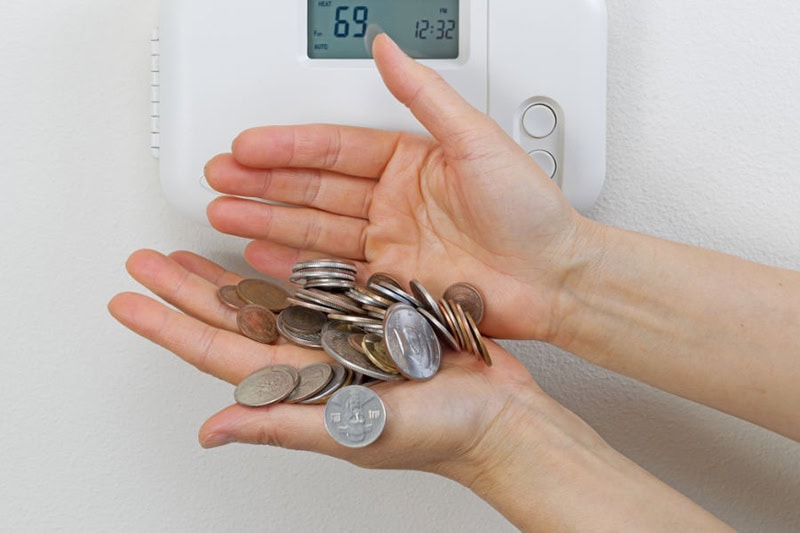Will I Save Money By Turning My AC Off When I’m Not Home?

In the picturesque Pacific Northwest, where summers can bring unexpected heatwaves, running the air conditioning (AC) to keep cool is essential.
But what about on more moderate summer days? Should you turn your AC off to save money when you are not home?
As summer rolls in, many around Bremerton find ourselves facing this perennial question. It’s a decision that can impact not only your comfort but also your energy bills and the life span of your air conditioning unit.
At Dana’s Heating & Cooling INC, we understand the importance of keeping your home comfortable without breaking the bank. Let’s delve into this age-old question and uncover the truth behind optimizing your AC usage for savings.
The Myth of Turning Off Your AC to Save Money
It’s a common assumption that turning off your air conditioner while you’re away saves money. The logic seems sound: if the AC isn’t running, it’s not consuming electricity, right?
Well, not quite.
Air conditioning systems work by removing heat and humidity from your indoor environment. When you turn off your AC, the temperature inside your home begins to rise.
When you return and turn the AC back on, it has to work harder and longer to cool the space back down to your desired temperature—negating any energy savings of turning it off for the day.
Don’t Risk Overworking Your HVAC Equipment
According to the U.S. Department of Energy, setting your thermostat 10 degrees higher than your preferred temperature while you are not home can save up to 10 percent of energy usage each year.
Savings from the 10-degree setback can be greater for buildings in milder summer climates, like that of the Kitsap Peninsula, than for those in more severe climates.
Smaller differences between indoor and outdoor temperatures lead to less energy consumption and, thus, more savings on your cooling bill.
Running your air conditioner consistently at a moderate temperature is often more energy-efficient than constantly turning it on and off. Here’s why:
- Reduced Strain on the System: Continuous operation maintains a stable indoor temperature, preventing your AC from undergoing frequent on/off cycles, which can strain its components and lead to increased wear and tear.
- Energy Spike on Startup: When you power up your AC after it’s been off for a while, a significant surge of energy is required to kickstart the cooling process. This initial burst of power consumption can offset any potential savings from turning the AC off.
Programmable Thermostats and the 15/20-Degree Rule
A programmable thermostat is one of the most effective ways to manage your AC’s operation while you’re away.
These smart devices allow you to schedule temperature adjustments based on your daily routine, ensuring your home stays comfortable when you’re present and conserves energy when you’re not.
When programming your thermostat, consider using the 15/20 Rule. This rule suggests keeping your AC unit at no more than 15 to 20 degrees Fahrenheit lower than the outside temperature. For instance, if it’s 95 degrees outside, you should set your thermostat between 75 and 80 degrees.
The logic behind this rule lies in the functionality of AC units. When the system cools space by more than 20 degrees, its capacity to both remove heat and dehumidify the air diminishes. This results in the AC working harder and using more energy, leading to faster wear and tear, reduced life span, and higher energy bills.
By programming your thermostat to raise the temperature during your absence and lower it before you return, you can enjoy savings on your energy bills without sacrificing comfort.
Other Energy-Saving Tips for Lower Energy Bills
While optimizing your AC usage is a significant step towards reducing energy consumption and saving money, there are additional measures you can take to enhance efficiency:
- Regular Maintenance: Schedule annual maintenance checks for your air conditioning system to ensure optimal performance and identify any potential issues before they escalate.
- Proper Insulation: Adding insulation helps minimize heat transfer and reduces the workload on your AC. Insulated windows, doors, and attics can help maintain a consistent indoor temperature.
- Airflow Optimization: Keep air vents unobstructed and ductwork clean, and ensure proper airflow throughout your home by cleaning or replacing air filters according to your manufacturer’s recommendations.
Expert HVAC Service with Dana’s Heating & Cooling
While turning off the AC could lead to savings under very specific conditions, you must consider potential drawbacks, such as increased wear and tear and health risks due to high humidity.
At Dana’s Heating & Cooling, we advise our Bremerton customers to focus on maintaining a balance between comfort and efficiency. You can enjoy optimal comfort while minimizing your environmental footprint and utility expenses by using programmable thermostats, practicing energy-conscious habits, and investing in regular HVAC maintenance.
Remember, informed choices lead to significant savings in the long run when it comes to cooling your home efficiently.
Call Bremerton’s Top AC Company Today
For expert HVAC services and personalized advice tailored to your needs, trust Dana’s Heating & Cooling INC—a name synonymous with reliability and excellence in Bremerton, Washington.
Contact us today at 260.226.7369 or schedule service online to keep your home cool and comfortable all summer long.